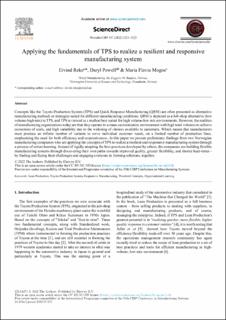| dc.contributor.author | Reke, Eivind | |
| dc.contributor.author | Powell, Daryl John | |
| dc.contributor.author | Mogos, Flavia Maria | |
| dc.date.accessioned | 2023-02-23T13:22:44Z | |
| dc.date.available | 2023-02-23T13:22:44Z | |
| dc.date.created | 2022-11-11T08:47:59Z | |
| dc.date.issued | 2022 | |
| dc.identifier.citation | Procedia CIRP. 2022, 107, 1221-1225. | en_US |
| dc.identifier.issn | 2212-8271 | |
| dc.identifier.uri | https://hdl.handle.net/11250/3053642 | |
| dc.description.abstract | Concepts like the Toyota Production System (TPS) and Quick Response Manufacturing (QRM) are often presented as alternative manufacturing methods or strategies suited for different manufacturing conditions. QRM is depicted as a Job-shop alternative (low volume-high mix) to TPS, and TPS is viewed as a method best suited for high volume-low mix environments. However, the realities of manufacturing organizations today are that they operate in a mass-customization environment with high total volumes to achieve economies of scale, and high variability due to the widening of choices available to customers. Which means that manufacturers must produce an infinite number of variants to serve individual customer needs, on a limited number of production lines, emphasising the need for both efficiency and responsiveness. In this paper we present preliminary findings from two Norwegian manufacturing companies who are applying the concepts of TPS to realize a resilient and responsive manufacturing system through a process of action learning. Instead of rigidly adopting the best practices developed by others, the companies are building flexible manufacturing systems through discovering their own paths towards improved quality, greater flexibility, and shorter lead-times - by finding and facing their challenges and engaging everyone in forming solutions, together. | en_US |
| dc.language.iso | eng | en_US |
| dc.publisher | Elsevier | en_US |
| dc.rights | Attribution-NonCommercial-NoDerivatives 4.0 Internasjonal | * |
| dc.rights.uri | http://creativecommons.org/licenses/by-nc-nd/4.0/deed.no | * |
| dc.title | Applying the fundamentals of TPS to realize a resilient and responsive manufacturing system | en_US |
| dc.title.alternative | Applying the fundamentals of TPS to realize a resilient and responsive manufacturing system | en_US |
| dc.type | Peer reviewed | en_US |
| dc.type | Journal article | en_US |
| dc.description.version | publishedVersion | en_US |
| dc.rights.holder | © 2022 The Authors | en_US |
| dc.source.pagenumber | 1221-1225 | en_US |
| dc.source.volume | 107 | en_US |
| dc.source.journal | Procedia CIRP | en_US |
| dc.identifier.doi | 10.1016/j.procir.2022.05.135 | |
| dc.identifier.cristin | 2072216 | |
| dc.relation.project | Norges forskningsråd: 313687 | en_US |
| dc.relation.project | Norges forskningsråd: 310079 | en_US |
| cristin.ispublished | true | |
| cristin.fulltext | original | |
| cristin.fulltext | original | |
| cristin.qualitycode | 1 | |

